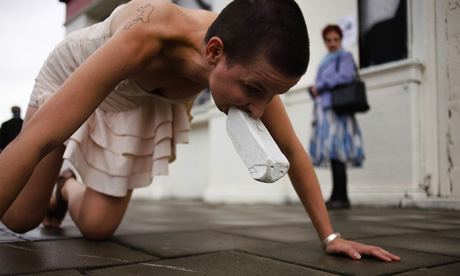Hackney Wick gallery Performance Space is one of a kind

Performance artist Karolina Kubic. Photograph: Marco Berardi
Performance art has been around for a long time. Even if you don’t know what it is, chances are you have been swept up in it yourself at places like the Tate Modern, where Tino Sehgal recently put on a show involving hundreds of performers blending in among visitors walking through the gallery’s Turbine Hall – starting conversations, moving in formations and suddenly dispersing back into the crowds.
Almost defying definition, the practice has evolved alongside new generations of artists over the years, with better known movements including the Happenings of the 1960s and the UK’s more contemporary Live Art scene.
“It is difficult to define,” says performance artist Bean, who founded the UK’s only space solely dedicated to the art, ]performance s p a c e [, in Hackney three years ago. “For me performance art is real, whereas theatre is representational. Artists use materials, objects and their bodies to make art works, but people have very different opinions!”
Although performance art is gaining traction, she says the discipline is still massively under-represented and valued within the arts world. The fleeting nature of much of the work means it is not something that can be sold or traded.
“The most obvious and immediate challenge is financial as performance art is not (historically) a commodity – it exists outside the standard art market where works are produced to be sold or theatre where shows ticketed,” she says.
Some artists see the discipline as a way to bypass galleries, agency fees and commissions to bring their craft directly to an audience. But this often makes it incredibly difficult to work as a performance artist, which is why studio room is available on a pay-what-you-can basis at ]performance s p a c e [.
Coming up at the space is the]performanc e x c h a n g e [, organised alongside the International Performance Association and City of Women. Bean says the project, set for 17 May, will highlight the importance of community, travel and collaboration to artists and look for answers in how to sustain this exchange, with pressures like lack of funding and the commonness of unpaid work.
“It is so important for artists to travel to develop their own work – if the UK takes its cultural identity seriously its artists need to be presenting work internationally and experiencing international work,” she says.
“We aim to cultivate work that critically and physically pushes the boundaries of body and space. It is a place where work can unfold without restraints or censorship, duration of space; committed to supporting challenging, unresolved and difficult work that embraces performance art as an ever-evolving medium.”
]performance s p a c e [
6 Hamlet Industrial Estate
White Post Lane, E9 5EN
performancespace.org
